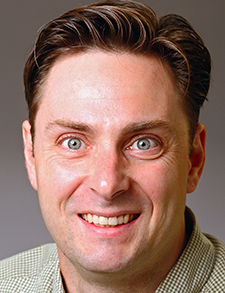 Perhaps the best description of SHM’s combined New Hampshire and Vermont chapter is camaraderie and curriculum, with a dash of snow.
Perhaps the best description of SHM’s combined New Hampshire and Vermont chapter is camaraderie and curriculum, with a dash of snow.

Dr. Krawitt
“We’re creating…a kind of neighborhood for hospitalists to be connected with one another independent of where they work,” said chapter president B. Justin Krawitt, MD, the system medical director of utilization and clinical documentation at Dartmouth Health and assistant professor of medicine at Dartmouth Geisel School of Medicine. “The opportunities that we have at academic medical centers and some large hospitals just aren’t there for a lot of hospitalists, and SHM can provide the forum to ensure a support network for all hospitalists.”
In the ski country that is the northern reaches of New England, that can be a different experience than in urban centers or warmer locales. It can mean long drives in inclement weather. Thus, scheduling a full-weekend continuing medical education course may fit the bill better than a single evening meeting. To that end, the New Hampshire-Vermont debut conference was held recently at Stratton Mountain Resort, complete with more than two feet of fresh powder on day one.
“In this region, there’s a lot of people who don’t always have the opportunity for CME time to travel a long way to larger national meetings, or the budget to do that,” said Dr. Krawitt, a 20-year veteran at Dartmouth who is based in Lebanon, N.H.
“And the other thing is, a lot of people are working in silos in these small states. What we realized was part of the mission of hospital medicine … the Society of Hospital Medicine is there to support hospitalists, period. And that means not just the ones at academic medical centers, who have lots of opportunities for CME learning, consultation, and meetings with subspecialists and experts.”
Dr. Krawitt says focusing on folks who need that type of attention has been a real success in member engagement for the chapter. “Having something local over the course of a weekend, that hits some of those buttons for people who are feeling more isolated or siloed in hospitals,” he adds. “People who don’t have the budget to do things, and in a way to kind of see what’s out there and deliver for folks. And if we’re going to do it, why not a ski area, right?”
The New Hampshire and Vermont regions can take on a broader geographical diaspora than many other chapters. There are a handful of population centers in each state—think Concord, Nashua, and Manchester in New Hampshire, and Burlington in Vermont—that can account for an outsized percentage of patients and physicians. To that end, locals started the two-state chapter in 2019 and Dr. Krawitt has remained in a leadership role since the COVID-19 pandemic to keep continuity.
“It’s gratifying,” he said. “I’ve met a lot of people. We’ve accomplished a lot of things. We did a couple of things that, for a small chapter, I think are pretty neat.”
Dr. Krawitt isn’t the only one who thinks it’s neat, as the chapter’s efforts earned it a 2023 Silver Chapter Excellence Award. Some chapters may be accustomed to accolades of that nature, but Dr. Krawitt says it really helps validate the efforts of those in more remote areas—a point he told SHM CEO Eric Howell directly at a recent chapter event.
“In some ways, I say, ‘Ah, the awards, okay, I guess it’s a feather in your cap,’” he said. “But in other ways…recognition from the national chapter is important because there are a lot of people putting in a lot of hours on this, and it’s all pro bono. All free. And when you think about the earning power and the other expectations on people’s plates from their work lives, and their home lives, the amount of hours of volunteer time that went into putting this on was pretty substantial.
“If you had to pay market rates to pay physicians to do that, you’d go margin-negative pretty quickly on something like this. SHM depends on the passion and spirit of volunteerism to get these things off the ground. So, I think that the idea that they recognize chapters for doing this is important.”
National awards are great, but boots-on-the-ground connections are better. Increasingly, the chapter is getting residents involved to get members involved earlier in their careers.
“A lot of residents get very little education on what it’s like to be a hospitalist outside of an academic center,” Dr. Krawitt said. “There are some not-so-nice things that we have to navigate. Whether it’s payer denials for services delivered or denial of appropriate benefits to patients, regulatory compliance, even fraudulent behavior of payers and providers, and many other aspects of revenue cycle operations. But they’re not exposed to or taught about these types of things in medical school or residency. I think that SHM, as an independent organization that supports hospitalists, can fill that void.”
Connection—along with camaraderie and curriculum—might as well be the third C in the chapter’s bio.
“Whether you’re from a critical access hospital, an associate provider, a resident, an attending, I want to put offerings out there that connect you to the career that you’re in,” Dr. Krawitt said. “You’ve chosen to be a hospitalist, and it’s a really admirable career…It’s not perfect. There are ways we can do this better. And how we come together and do that is important.”
Richard Quinn is a freelance writer in New Jersey.